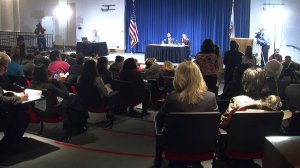As an estimated 1.4 million residents who are here illegally are preparing to obtain licenses for the first time in California, their excitement of living a normal life is coupled with fear.
“Instead of being happy, the hope is limited because of all the restrictions they are going to have to deal with,” undocumented immigrant advocate Idania Peralta said Tuesday.
Such restrictions include possible increased license fees and just how undocumented residents will meet all the basic requirements.
“They are asking for an affidavit saying that you are an undocumented person, meaning they could share that with ICE. Even though they say they are not going to share it, they might,” undocumented resident Juan Garbriel said.
During the first public discussion on the matter, dozens voiced their concerns before the DMV as they begin the process of implementing the new law.
“We are going to have to verify two things, that the person is who they say they are and that they are California residents. Which documents will we accept? We are going through that process right now,” DMV Spokesperson Armando Botello said.
Assembly Member Luis Alejo, who drafted AB60, which was signed into law by Gov. Brown last year, says there are four categories of identification the bill requires including proof of residency, a birth certificate, and a consulate ID from their country.
Botello says the DMV hasn’t decided on what forms of identification the department will take.
“We can always improve the law in the future. The thing is to make it a reality. Let’s get this going and let’s give the people the opportunity to go to work, the school and the grocery store legally,” Alejo said.
Many also worry that the new license which will have a distinct marking will make undocumented residents a target for racial profiling.
The new law must be implemented no later than January 2015.
However, Alejo hopes to see it implemented and fine tuned within the next few months.

